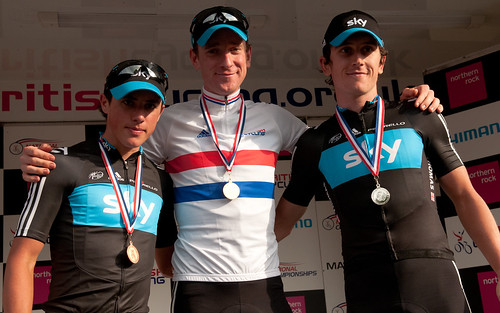
This past weekend the majority of cycling nations held their national elite championships in the road race and time trial. Cyclingnews.com has a round up of all the results here. Many of the big names around the world ride their national championships, and it's seen as prestigious to win, and entitles victor to race in their national champion colours for the remainder of the season. I don't know how the UCI has managed to coordinate each country to use the same dates, however it's an idea that could be applied to elite triathlon as well.
In the early days of elite triathlon, winning national champion title was taken more seriously than it is currently. With the plethora of racing options available to elite triathletes these days, for many athletes the national championships has become less relevant. Compared to cyclists, triathletes can race a much more limited number of times, and with the ITU World Championship Series, the Olympic qualifying/ranking pathway, as well as commitments to French and German clubs, in addition to the numerous other non-drafting options, many countries 'national championships' are not really representative of the best of their countries, with the top athletes often taking a pass, when they are permitted to do so.
Looking at the British Triathlon site, the information on the 2011 elite national championships is not even listed, however 'insider' knowledge says that the Windsor Triathlon was indeed designated as the National Championships at a relatively late stage - however a quick look at the results shows no Brownlees, Clarke, Hayes, etc, or Jenkins, Blatchford, Holland, etc on the women's side. With all due respect to the respective winners, when the top athletes don't show up, it devalues what it means to be named a 'national champion' for all involved.
British Triathlon tried a different approach in 2010 when the elite national championships was held over a sprint distance in an effort to draw the best British athletes with minimal disruptions to their racing programmes. However even with a national team contract clause requiring funded athletes to race, and the promise of respectable prize winnings and television coverage, it was still a struggle to pull it off. Now back to 2011, the funded athletes were allowed to pass on the nationals again, in order to pursue other races.
Other countries have faced similar challenges, a quick look at the results shows Australia used the Mooloolaba World Cup this year as their national elite championships, so 'tacked on' to another bigger event. Meanwhile New Zealand, and the USA suffered from the 'not all the best show up' problem. Other countries no doubt are facing similar issues.
The solution is to look back at cycling - say what you will about the state of the UCI, however they have managed to coordinate an integrated international calendar across many competitions with different organizers, including fixing dates for the respective national championships. The ITU could do the same, and solve the date conflict issue. It would of course be a big challenge to do so, but coordinating dates and avoiding conflicts with their own racing properties, the World Series, World Cups, and Regional championships would be a good start. The UCI also seems to have managed to have southern hemisphere countries racing the same dates, out of the normal 'summer' season, so as far as the elite championships in triathlon go that could work as well.
The other aspect is adding prestige back to the title - again looking to cycling, have unique racing uniforms in national champion colours, and promote these athletes on the WCS television coverage. The ITU is already part way there toward the uniforms, now that at the World Series each athlete must wear a country-colour uniform already - just add some national champion stripes and off we go. The coordinated dates also highlight the respective countries events, and make the winners newsworthy. When the best athletes are racing for their national colours and these athletes are highlighted, it will help restore some pride to what it means to be the national elite triathlon champion.
Perhaps none of these changes would be enough to have better representation at respective elite national championships, but looking at other sports like cycling shows that it's possible if the will is there to make being a national elite champion significant again.
Now what to do about making the ITU Regional Championships relevant enough that all the top athletes show up?
